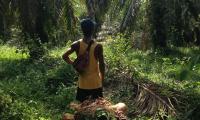Nestlé takes further steps to improve labour conditions in Indonesia´s palm oil industry

The report, commissioned by Nestlé, presents the findings and recommendations from an assessment of labour- and community rights impacts in Nestlé’s palm oil supply chain in Indonesia. The assessment, undertaken by DIHR and TFT, with support from Nestlé and supplier Golden Agri-Resources (GAR), represents the first collaboration of its kind for palm oil focused on identifying human rights impacts in a company’s direct and indirect supply chain.
While a number of studies have previously highlighted the adverse labour impacts of large palm oil plantations in Indonesia, this assessment has revealed the complex challenges faced within the broader palm oil industry. The assessment included focusing on the role of smallholder farmers, who produce more than 40 percent of Indonesia’s palm oil, as well as the labour and environmental impacts of independent palm oil processing mills.
Nestlé and supplier Golden Agri-Resources take action
Building on their responsible sourcing programmes, both Nestlé and GAR have developed and published individual action plans to address the findings of the assessment. As part of its Global Action Plan on Palm Oil, Nestlé has committed to conduct issue-specific trainings with industry partners that reach beyond their direct Tier 1 suppliers, and to work with companies, including GAR, to engage directly with smallholders in order to build linkages between smallholders and mills and implement Good Agricultural Practices. GAR is working with its supplier mills to improve human resources policies and procedures, including providing training to responsible personnel; ensuring suppliers comply with legal limits on working hours; focus on occupational health and safety; and social dialogue processes between employees and employers.
Palm oil accounts for 35 percent of the world’s vegetable oil consumption and is used in almost 50 percent of supermarket products. Indonesia is the largest producer of palm oil in the world, and the industry employs an estimated 3.7 million people, formally and informally. In 2016, the country produced 34 million tons of palm oil, which constitutes more than fifty percent of the world’s supply. Nestlé S.A. buys 460,000 tonnes of palm oil annually.
Increasing focus on impacts in the upstream supply chain
DIHR has collaborated with Nestlé since 2010 to integrate human rights into the company’s policies and procedures, through the review of policies, and conducting Human Rights Impact Assessments (HRIAs) at the country level. To date, Nestlé and DIHR have conducted 12 human rights impact assessments together. In 2013, the joint publication ' Talking the Human Rights Walk 'shared approaches, aggregated findings and lessons learned from the first seven HRIAs. The current report represents the next step in Nestlé’s on-going journey to communicate transparently about the company’s s human rights impacts, as it seeks to focus more intensively on human rights impacts in its supply chain.
While previous assessments have focused on Nestlé’s own operations and the direct sourcing of commodities at a country level, this labour rights assessment was the first of its kind to take a deep dive into one of Nestlé’s complex upstream agricultural supply chains, focusing on collaborating across the supply chain, including the active involvement of one of Nestlé’s main suppliers. To ensure local follow-up and consistency with already existing initiatives, DIHR has collaborated with The Forest Trust Indonesia office, which will be actively involved in Nestlé's follow-up activities to the assessment.
“We are glad that Nestlé and GAR have developed action plans to address the issues identified in this report. The aim of this assessment, and our collaboration with Nestlé, is to secure improved human rights conditions for workers and communities in the Indonesian palm oil supply chain, all the way down to the individualfarmerand his or her family. We hope that this report serves as a wider call to action for other industry players across both the public and private sectors,” says Claus Teilmann Petersen, Department Director Human Rights and Business, DIHR.
See Nestlé Global Action Plan on Palm Oil
See Golden Agri-Resources Action Plan
The labour rights assessment, which took place in July-August 2017, focused on the supply chain of Nestlé and one of its main suppliers of palm oil, Golden Agri-Resources (GAR) in North Sumatra and Jambi, Indonesia. The assessment focused on a refinery, a number of palm oil processing mills, a large palm oil estate and smallholder farmers.
Read more about Nestlé's partnership with DIHR.
